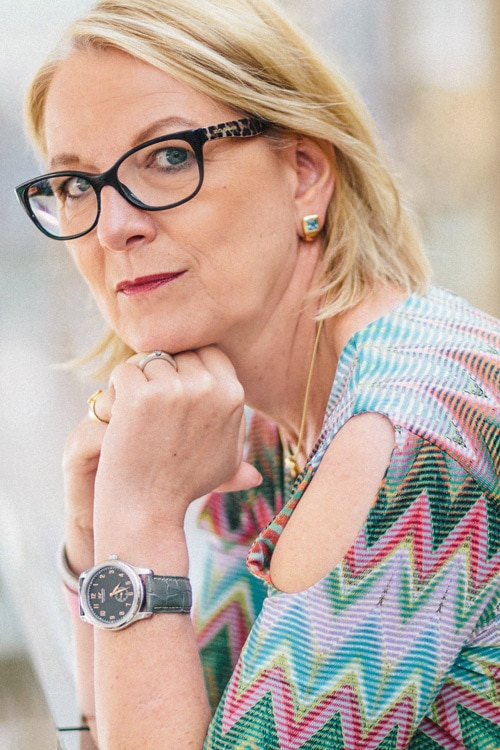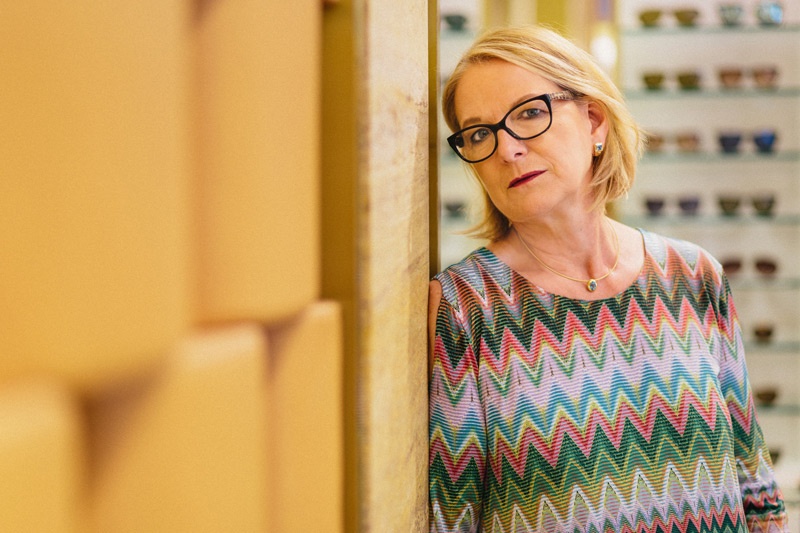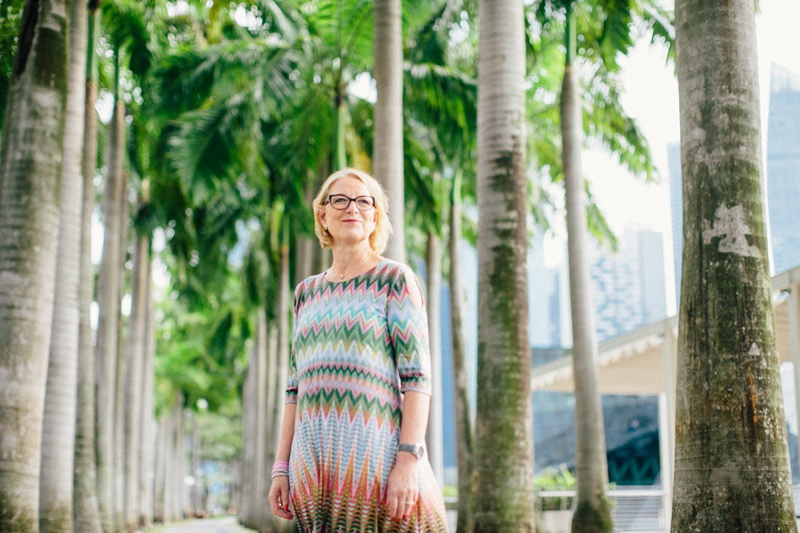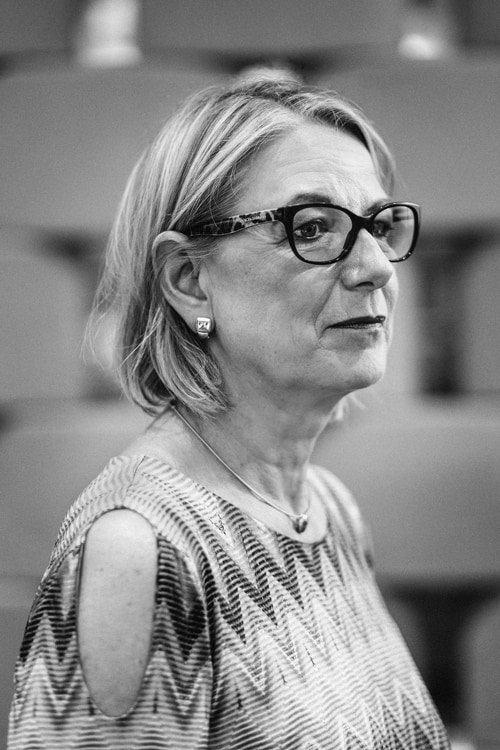Heroes of the business world are often characterised by their brazen displays of boldness. Their journeys frequently bear the hallmarks of an epic tale: dramatic rises from rags-to-riches, groundbreaking derring-do, unparalleled tenacity in the face of seemingly insurmountable challenges, and windfall payoffs culminating from hard work, luck and timing. This is the stuff of legends fuelling every would-be entrepreneur and businessman, though what is often forgotten or overlooked especially in today’s preternatural frenzy for the newest, latest and most cutting edge, is the equally (if not more) difficult task of growing and sustaining an established business in such fast times. Christiane Brunk is the fourth generation descendant of the Braun Büffel leather accessories house and its current managing director. It’s a weighty mantle that she took over from her father in 2005, with duties of not only being a custodian of the Braun family legacy, but also the primary guardian to a nearly century-and-a-half old traditional business. Originating in 1887, as a saddle and upholstery workshop in the leather-making town of Kirn, Germany, Braun Büffel (‘brown bull’ in German) has grown to become an international fine leather goods and fashion house well recognised for its quiet luxury in terms of quality and function. This year, the storied brand celebrates its 130th anniversary in an age of widespread industry disruptions, upstart start-ups, pervasive social media, and global political and economic precariousness. Christiane is candid about how she’s navigating a brand known more for its Teutonic steadfastness and practicality than fashionable versatility, through the winds of change. Ultimately, finding balance between near and long-term goals, plus the patience to see them through, is what keeps her going. “Perhaps this is my German character speaking, but I need to be organised. This is something that I always tell my younger employees: it is important at the start of each day to sit down, plan, and bring structure to your day. It can be difficult when you are rushed for time, but just taking 15 minutes to survey your current tasks, not only helps you delineate the important things, but reduces the pressure you’ll feel throughout the rest of the day.” Under Christiane’s tempered leadership, this 130-year-old bull certainly won’t be rushing headlong or blindly into the fray, choosing instead to take measured steps to go the distance.
Conversations with Christiane Brunk
TEO REN FENG: What is your first memory of leather?
CHRISTIANE BRUNK: I was always keen to help out with the business when I was a child, and we have a day in Germany, where all the children would bring their savings to the banks and receive a present for it. The bank had ordered from us red leather heart purses with a lucky penny in each, and my job was to sort out the pieces in the factory. [laughs] I was maybe 6 or 7 years old, and that was my first experience with leather.
REN FENG: Was joining the family business always an eventuality?
CHRISTIANE: I had a period of leave between jobs where I did not know what to do, and my original plan was to travel a little and work in foreign countries. However, my father asked me to help out with the business, and seeing that he needed someone to handle the new technologies and changes, I agreed. After 3 months, I said yes when he asked if I would be willing to join the business full-time.
REN FENG: Can you imagine doing anything else now?
CHRISTIANE: Sometimes, when I’m faced with a difficult situation. [laughs] There are always moments when you fall into doubt, but I really love what I do.
REN FENG: You are the first woman to have helmed Braun Büffel in 4 generations. Do you think you add something new to the table as a female?
CHRISTIANE: Sure! More emotions. [laughs] I worked together with my father for quite a long time, and it’s a different management style. As a woman, one is more sensitive to not only the staff and issues going on within the company, but also towards the consumption habits and moods of customers.
REN FENG: Has that effected a change in the company culture?
CHRISTIANE: Yes, but it is also a matter of the generational difference. My father’s generation was more hierarchical, where the boss sets the direction and everybody simply follows—no discussions. For me, it is important that the strategies we implement are a product of the team, because they will only follow you, if they believe the direction is right. We hold a lot of discussions, and decisions are made as a team.
Sometimes when you’ve been in this business for a long time, you become a little ‘blind’—you cannot imagine that there is a younger crowd who is interested in craftsmanship.
REN FENG: How has the industry evolved since you took over in 2005?
CHRISTIANE: Previously, consumers focused on things like functionality and the quality of a product, but with millennials, the story behind the brand also matters. I feel like we have a very rich base on this front, since we have a long heritage to share that adds meaning to our products. We’ve also identified that the customers of today want to experience the brand, and gain insight into the manufacturing process to better understand how our products are being made.
REN FENG: What steps have you taken to improve on and further your customers' experience of the brand?
CHRISTIANE: We had a Do-It-Yourself workshop here in Singapore last year, when we opened our latest boutique at Marina Bay Sands, and the turnout was fantastic. Sometimes when you’ve been in this business for a long time, you become a little ‘blind’—you cannot imagine that there is a younger crowd who is interested in craftsmanship. I thought that the younger generations would find it quite boring, but I was so surprised to see an average age of around 30 in attendance. Seeing them sit down and be so interested and excited to be part of the production process, made me realise that there was something here. We tried the concept back home in Germany as well, and it just proved to us that millennials are interested in learning about our story, understanding how a product is being made, and where the leather comes from.
We are not a company that makes tremendous changes within 3 months.
REN FENG: In refreshing and renewing the Braun Büffel brand, how do you determine what to keep and what to discard?
CHRISTIANE: I think to survive as an international brand, you have to accept a certain percentage of new things. Try and test to see what the consumer likes, because at the end of the day, they are the ones who buy and use your products. We are now on Instagram and Facebook, to share our stories and content with a wider audience. It’s been a learning process, but what surprises me most is that it is so easy to test ideas or initiatives, and receive immediate and direct feedback. It’s also why it’s always good to add new blood to the team—for fresh points of views and ideas. Our guiding principle is to retain the quality of workmanship and leather, which essentially make up 50% of a product. With this foundation, one can allow about 25% room for change and development.
REN FENG: Coach, another “affordable luxury” brand underwent pretty major rebranding in the last decade, which made their designs and appeal much more fashion-forward. Is that the direction that you see Braun Büffel heading to?
CHRISTIANE: We are still working on this front and our collections through the last couple of years, have reflected some form of change, with great responses from customers. But it is also a learning and trying process for us. We are not a company that makes tremendous changes within 3 months. We make stable movements, even though we are really fascinated by the developments that new media brings.
REN FENG: Do you ever worry about the exponential pace of change today?
CHRISTIANE: It is one of our key characteristics to not be an early-adopter. At times, it is better to take a back seat, and observe how things pan out before making a strategic decision, which has worked well for us in the past. We might not be ahead of the trends in some areas, but we are focused on what is important, which is to study and make the best decision in the long run.
REN FENG: Affordable luxury lifestyle brands like Michael Kors and Kate Spade have been struggling with the poor retail economy, and shuttering their stores. Do you think there is still space in the market for affordable luxury?
CHRISTIANE: I still see a space. Even just looking at the millennial target group, they are interested in concepts like personalisation and customisation, which as a premium label and affordable luxury, we are ready to provide. I would say that brands like Michael Kors are over-distributed. Braun Büffel wants to be available at the right points of sale, which doesn’t necessarily mean being on every street. Not everybody carries Braun Büffel, and we are focused on rewarding our customers with some exclusivity and the experience of feeling like you belong to the Braun Büffel family. We don’t want to be everywhere, but still wish to provide our consumers with the knowledge and association that our brand is popular, global and fashionable.
REN FENG: It’s a very delicate balance.
CHRISTIANE: Yes, but what is easy these days? [laughs] Sometimes you face challenges and watch the market react. We’ve always operated in that fashion, choosing to remain unaffected and not feel the need to be rushed by change. We have a clear strategy and focus, and I think we are on a good path.
REN FENG: It’s not easy to take on the mantle of a 130-year-old family business. Are you afraid of failure?
CHRISTIANE: I think that it is normal for a business to have its peaks and lows. You are not always successful, but sailing in stormy weather teaches you to run your ship in difficult times. Sometimes situations like a financial crisis and quiet markets are beyond your control, but we have always overcome them with a stable business foundation. Even in difficult times, we try to take small steps to continue our legacy.
REN FENG: What are your greatest personal strengths?
CHRISTIANE: Positive thinking. It’s helped me see the silver lining in every negative situation.
REN FENG: Toughest times in the course of your career?
CHRISTIANE: The 2008 financial crisis was a really tough time for us and we lost several markets completely, like Russia, for example. It was a very difficult period for our European operations.
REN FENG: What was your silver lining in that situation?
CHRISTIANE: Being able to speak with others openly about our problems. One should actively approach problems—that is better than being afraid of what might happen. Be open when you’re finding solutions to your problems.
Sometimes you just have to listen to your inner voice.
REN FENG: What has been the greatest challenge you had to overcome in your career?
CHRISTIANE: [pauses] Here in Asia, it was a good development to open standalone stores. But it was personally very challenging for me when we decided to start our first standalone store in Munich, in 2014. It involved huge investments and I was afraid of losing customers in departmental stores, which make up the traditional network of how German brands are distributed and sold.
REN FENG: How has the reception to the store been?
CHRISTIANE: It’s been very good and I think our retailers have accepted and come to see this move as a form of marketing support. In our store, a consumer can experience and see for themselves the whole range of product offerings, which is a win-win for both our brand and our retailers across the country. My customers from Germany and Europe like to share with me their experiences with the brand overseas, like in China and Singapore, where we have more stores. It’s a good form of brand communication—that the business is global. People travel a lot these days and if they are happy with what they see here in Asia, that reinforces their impression of the brand.
REN FENG: What makes a good brand for you?
CHRISTIANE: A good brand should be aware of its roots and have a clear image and unique ’handwriting’. We know exactly where we come from and one should not experiment too much with changing or widening that DNA. Everything that we do should agree with our DNA.
REN FENG: What or whom have you relied on the most to achieve success and growth as a leader?
CHRISTIANE: To some degree, my intuition. Sometimes, you cannot make every decision based on figures alone. I’m normally a person who’s about facts and figures and I studied business administration. But this is what I have learnt—sometimes you just have to listen to your inner voice.
REN FENG: Being that you are a fan of detective novels, I presume you would rely on logic.
CHRISTIANE: Yes, but besides logic, your feelings and intuition are also what you sharpen and fine-tune, with age and experience. You learn from experiences and over time, you just know what to do. You don’t get nervous and just go for it.
****
Edited by Wy-Lene Yap





